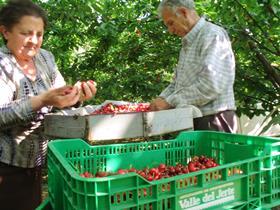
A sharp drop in the availability of seasonal workers is causing consternation among cherry producers in Spain’s Jerte Valley as they gear up for a bumper harvest.
Arrivals of migrant pickers – primarily from Romania – are estimated to be down by around 40 per cent this season.
With fruit building up on the trees and prices at rock bottom levels due to a heavily oversupplied European fruit market, optimism is fast giving way to dismay that yet another season could be scuppered.
The Jerte Valley Cooperative, which groups together some 3,500 small producers and accounts for 65 per cent of the region’s cherry volume, told El Periódico Extremadura that its crop to weigh in at 20-22,000 tonnes, barring an unforeseen climatic events.
“This is on track to be a record year provided the weather stays on our side and we don’t see any temperature peaks or rains in the coming weeks,” said president Emilio Sánchez Serrano.
Although hail caused the loss of around 150ha in El Torno and Rebollar a few weeks ago, the threat of storms has now subsided.
In all, the valley’s cherry output is on course to break the 35,000-tonne barrier this year. This is in sharp contrast to last year, when Extremadura harvested just 12,000 tonnes and lost its position as Spain’s leading cherry producing region to Aragón.
But the shortage of workers is casting a long shadow over the industry. “We simply don’t have enough people to collect the cherries,” Ernesto Agudiez of the Grouping of Municipalities of Valle del Jerte, told the journal.
He noted that the shortage is being compounded by all the varieties maturing at the same time and causing a supply glut.
“When a fruit is overripe you can no longer take it to the market. If we can’t harvest it all we’ll have to leave some of it on the trees,” he said.
Sánchez said it is unclear why the influx of seasonal workers has fallen so sharply. “People who came in previous years have not done so this year and although we are seeing the arrival of Spanish pickers, a large proportion of the workforce is new and needs to be trained up,” he says.
The shortage is also causing a headache in the packhouse where the labour force is made up almost entirely of domestic workers. “We don’t have the numbers we’d like,” Sánchez continued. “Once we’ve exhausted the current supply we will have to resort to SEPE [the National Employment Institute] to make up the shortfall.”



